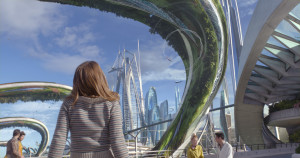Imagine a place where the world’s best and brightest converge to create the perfect society, free from the pesky influence of outsiders. This utopia could easily look exactly like our present – except with everything running more efficiently. In “Tomorrowland,” the latest feature from Brad Bird (“The Incredibles,” “Mission Impossible: Ghost Protocol”) uses the retro-futurist dreams of post-war America as his template, refreshingly approaching the eponymous world of tomorrow not with pessimism, but with hopeful whimsy. As one character puts it, it does not matter if the dimension’s construction is practical – what matters is that it is fantastic, inspiring a sense of limitless possibility. Considering the fact that “Tomorrowland” is a film about the positive power of optimism, this approach is highly successful, making it easy to overlook several of the script’s weaknesses.

“Tomorrowland” begins with a prepubescent Frank Walker (Thomas Robinson), a budding inventor, submitting his almost-working jetpack to the 1964 World’s Fair. While the officious judge David Nix (Hugh Laurie) refuses to accept his work, his young aide Athena (Raffey Cassidy) sees the potential in Frank’s wide-eyed optimism. A a result, she hands him a conciliatory Tomorrowland pin, a device that allows him to travel to a retro-futuristic world of jetpacks, monorails and rocket ships.
The film then fast-forwards to the present day in which Casey Newton (Britt Robertson), another optimistic inventor, is fighting against a world that fears risk-taking and embraces pessimism. She seems almost ready to give up, until she stumbles upon the pin. Like Frank before her she is thrust into the fantastical world of Tomorowland, which the potential of human imagination. One of the film’s best sequences is a long tracking shot following Casey as she first travels to this hidden city, each step revealing a new wonder to be explored.
However, after only this brief glimpse, Casey is unceremoniously kicked out, forced to go on the run for life by a group of pernicious G-men who want to prevent anyone from ever reaching Tomorrowland again. This, in turn, leads her to form an alliance with fellow fugitives Athena, who suspiciously has not aged in decades, and Frank Walker, who has evolved into an embittered crank (now played by George Clooney).
As the central trio, Clooney, Robertson and Cassidy are all quite good. Clooney plays both the cynical and idealistic sides of Walker with ease, though even this veteran actor is outshined by the younger female leads. Robertson excellently portrays not just Casey’s idealism, but also her excitement. After a particularly enthralling set-piece she lets out a yelp that resembles the joy of a child exiting a rollercoaster. In a summer blockbuster season that looks to be dominated by angst, her enthusiasm and drive are refreshing. Likewise newcomer Raffey Cassidy is brilliant as Athena, playing a character that appears calm and wise far beyond her years, while still emotionally moved by Frank’s sadness and Casey’s hope. Despite the competition from numerous more established thespians, Cassidy is just about the most compelling A.I. character this year (my apologies to Ultron).

Director Brad Bird is in similarly fine form, clearly a natural at shooting films with a sense inventiveness and joy. When we first see Tomorrowland from Frank’s perspective it is a world of possibility, shrouded in fog and only glimpsed in brief sun-drenched flickers. When we next see Tomorrowland from Casey’s view, the skies are golden and clear, with Tomorrowland existing beyond the horizon, just out of reach, a tantalizing vision that confirms all our hopes about the power of optimism. All of the actions scenes are magnificent works of physical comedy, with each action leading to a logical reaction that then needs to be resolved. In one scene, Walker uses a giant magnet to trap a G-man; in another the Eiffel tower itself opens up to reveal a hidden rocket ship inside. It is this creativity that prevents “Tomorrowland” from becoming a dull, shoot-em-up affair and keeps the film pumping with a certain childlike exuberance.
If there is any true flaw with “Tomorrowland,” it’s that Bird and screenwriter Damon Lindelof don’t seem to trust the actors and the filmmaking to convey their message. Additionally, the film relies on a series of straw-men pessimists who exist solely to give lengthy monologues about the inevitable demise of humanity and to wallow in pessimism without any well-defined reason for doing so. These on-the-nose assertions lessen the film’s thematic complexity and slow down its considerable momentum.
Flaws aside, “Tomorrowland” is still a highly enjoyable work – one with great acting, great direction, and an interesting message about the self-perpetuating power of positive thought.
Contact Raymond Maspons at raymondm ‘at’ stanford.edu
